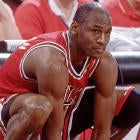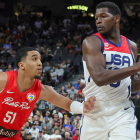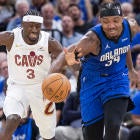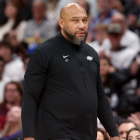Michael Jordan and Nike are synonymous. To this day, countless versions of Air Jordans sell out within minutes, while different designers and musical artists take a stab at recreating Jordan shoes as an homage. As we learned in the "The Last Dance," however, getting Jordan to sign with Nike was no easy task.
In a break from showing us dominant performances by Jordan, the fifth episode of the 10-part documentary chronicling the 1997-98 Chicago Bulls' quest for a sixth championship tells the story of how he became a global brand. In it, the previously reported story of Jordan not wanting to sign with Nike comes to light. Some context is needed in understanding why Jordan wouldn't want to sign with the sportswear juggernaut that we know Nike to be today.
Back in 1984, Nike wasn't generating tens of billions of dollars in revenue, and were widely known as a company that sold track shoes. This was also during a time when Converse was the official shoe partner for the NBA, and the Converse Weapon was the shoe worn by players such as Magic Johnson, Isiah Thomas and Larry Bird. So naturally, Jordan -- a rookie at the time -- wanted to join that roster of elite talent. However, as Jordan says in the documentary, Converse didn't think a rookie was going to become bigger than Magic and Bird.
With Converse out of the picture, Jordan had his sights set on Adidas, and while the company with three stripes would've loved to have Jordan sign with them, making a basketball shoe wasn't a possibility for them at the time. That's where Nike comes in. Jordan's agent, David Falk, wanted him to sign with Nike, but the budding superstar wasn't hearing it.
"I wanted Michael to go with Nike because they were the upstart," Falk says in the documentary. "I couldn't even get him to get on the damn plane to visit the campus, so I called his parents."
That's when things changed. Falk called Jordan's mother, who told her son he at least needed to hear Nike out.
"My mother said, 'you're going to go listen. You may not like it, but you're going to go listen,'" Jordan recalls. She made me get on that plane and go listen."
Part of the deal that Falk negotiated with Nike was ensuring that Jordan would have his own signature shoe. That's an unprecedented ask, even by today's standards because there's no guarantee that the player will even sell a significant amount of shoes to make it worth it. However, Falk was trying to build Jordan in the image of an individual sport athlete who could be their own brand.
"Our firm ProServ had a lot of very high profile tennis clients like Jimmy Connors, Stan Smith and Arthur Ashe," Falk said. "Arthur Ashe had his own shoes and tennis racket. So the strategy was to try and take a team sport player and treat him more like a golfer, boxer or tennis player, and the very first deal was shoes."
Nike agreed to giving Jordan his own signature shoe, as well as a $250,000 contract as a rookie.
"Nike's expectation was at the end of year four they hoped to sell $3 million of Air Jordans," Falk said. "In year one we sold $126 million."
Not only did the Air Jordan 1 model sell extremely well when they were first released, they transcended the realm of basketball. Two years after the Jordan 1 hit the shelves, Spike Lee made sure his iconic character Mars Blackmon in "She's Gotta Have It" was wearing Air Jordans. That quickly launched the "It's Gotta Be the Shoes" ad campaign that made Jordan's shoes a hot commodity.
It's been 22 years since Jordan suited up for the Bulls, and yet in December of 2019 his brand earned its first $1 billion quarter. Had Jordan not signed with Nike in 1984, he likely still would've built a brand just based on his dominant play. However, if it weren't for his mother, we'd be sitting here talking about the Adidas or instead of the pairing of Jordan and Nike.






















